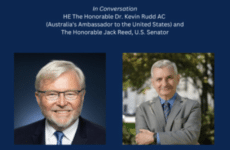By: Philip Dine/St. Louis Post-Dispatch (KRT)
Posted In: News
WASHINGTON – The recent spread of violence in Iraq confronts the United States with a situation that is both dangerous and delicate – and one that military strategists want to deal with quickly lest it spin out of control.
As a result, military commanders are considering whether to bring more American troops into the country, a senior official with U.S. Central Command told reporters at the Pentagon Monday.
“Given the events of this weekend and the obvious potential for more demonstrations or more violence, we have asked the staff to at least take a look and see what forces are available out there in a quick response mode, in the event that they should be needed,” the official said, according to a transcript provided by the Pentagon. The official spoke on condition of anonymity.
What is particularly worrisome is that resistance to the American occupation is now coming from not just from elements within the Sunni triangle, including Fallujah, but also from followers in southern Iraq of radical Shiite cleric Muqtada al-Sadr — raising prospects of broader civil strife.
“It’s extremely serious. It’s not one situation but several situations going on at the same time,” said Rep. Ike Skelton, D-Mo., ranking member of the House Armed Services Committee.
“You have to nip it in the bud now, because if you let either of these groups get away with it, it’ll spread like wildfire and you’ll have a civil war on your hands.”
Failure to stem the violence could also jeopardize U.S. plans to hand over sovereignty to the Iraqis by June 30, a commitment reiterated Monday by President George W. Bush.
“This is all a prelude to the lead-up to the 30th of June,” said retired Air Force Lt. Gen. Tom McInerney. “If we don’t break the back right now of both insurrections, we are not going to be able to turn over sovereignty on June 30. If we don’t handle each of them right, we are going to have a very big problem.”
Bush said the United States is being “tested” in Iraq by forces that want U.S. policy — and Iraqi democracy — to fail. But “thugs and terrorists” will not deter the administration from the goal of a free and democratic Iraq, Bush said.
Still, continued violence could complicate the handover, said Batsheba Crocker, a former State Department attorney and National Security Council official, who directs the post-conflict reconstruction project at the Center for Strategic and International Studies.
“The security situation appears to be spiraling, if not out of control, at least in a very dangerous direction,” she said.
How U.S. forces react is critical, say military experts, because an overly aggressive response could play into the hands of insurgents. The dilemma is that the very actions most likely to be effective in showing insurgents who’s in charge — such as a no-nonsense military crackdown on Fallujah — might alienate large segments of the population.
“This is difficult. You’ve got to be very tough and hard. On the other hand, you’ve got to be compassionate, show you understand the culture,” said David Grange, a retired brigadier general who commanded the 1st Infantry Division in Bosnia, Kosovo and Macedonia.
The best way to succeed in this difficult balance is to act in a crisp manner by isolating Fallujah and other trouble spots while enlisting the support of Shiite clerics in the south, Grange said. “How do you do that without starting a civil war? It’s going to take a partnership, and that’s the tough part of the mission,” he said.
U.S. forces have to display “overwhelming firepower” but use it in “laser-like” fashion, McInerney said.
Aside from a possible linking up of the Sunni and Shiite insurgents, which many analysts doubt will happen, the more likely prospect is that success by either group in striking coalition targets or cooperating Iraqis could serve to embolden the other.
U.S. officials had basically written off al-Sadr as a major force, believing he has little support even among Shiites. But his 3,000-member militia and the appeal of his hard-line stance against the occupation are sparking concerns.
“The most surprising or disturbing thing to me in Iraq is the possibility that Sadr might be a stronger actor than we had heretofore recognized,” said Tom Donnelly, military expert at the American Enterprise Institute and former policy director for the House Armed Services Committee.
“By closing his newspaper, we kicked sand in his face. So in some ways, it’s not surprising that there’d be some reaction. But there’s just a lot of deals being cut among individual resistance figure in Iraq, a lot of stuff we don’t know. Taking Sadr as an example, he may have more strength than we originally accounted for,” Donnelly said.
If violence grows and a civil war breaks out, that would be “the worst conceivable outcome in Iraq,” said Daniel Benjamin, Middle East and terrorism expert at the Center for Strategic and International Studies, and a former National Security Council official.
“It could lead to Iraq being the kind of place in which terrorists could operate with impunity, thus making up for the loss of Afghanistan.”
But Jack Spencer, military expert at the Heritage Foundation, said that while things look difficult now on the ground, his biggest fear is that the American public will lose its appetite for sticking with the U.S. commitment.
“Even with the problems that are occurring, this is all part of the evolution of democracy in Iraq,” he said. “We’re seeing history being written.”
___
c 2004, St. Louis Post-Dispatch.
Distributed by Knight Ridder/Tribune Information Services.














